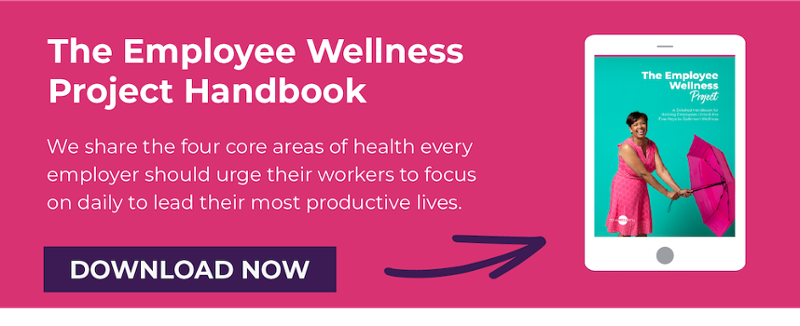 Are you missing out on self-care benefits right now?
Are you missing out on self-care benefits right now?
Whether you’re working long hours or reorganizing how your work day flows or just generally taking care of business, it’s easy to push self-care needs to the back burner.
In these trying times, there are major self-care benefits we can all take advantage of right now. Self-care is essential for optimum health and stress management, factors we all need to consider given the current public health crisis.
Ready to reap the benefits of a little self-care time?
Here, we dive into how to build confidence and self-esteem while also taking care of your health through self-care techniques.
What is Self-Care?
By definition, self-care is “the practice of taking action to preserve or improve one's own health.”
And right about now, we all need to be improving our health in whatever manner we can.
That includes mental and physical health, which looks different for every individual. Self-care routines include activities you do both inside and outside of work to help you keep up with your life in a healthy way.
Examples of self-care include:
- Practicing yoga
- Taking lunch breaks
- Maintaining a health diet
- Enjoying a long bubble bath
- Using your vacation time or sick leave
- Implementing a meditation practice
- Distancing yourself from toxic people
By sticking to some sort of self-care routine, it reminds yourself (and others) that you need time to yourself for rejuvenation.
5 Easy Ways to Practice Self-Care
Now that most of us work remotely from home, you spend less time commuting. This leaves more time for self-care practices and focusing on overall well-being.
Take the time you would have spent on your commute to instead work on self-care that will help you in all aspects of life.
Below are five easy ways to get into a self-care routine.
1. Start an Exercise Routine
Now more than ever, it’s important to move your body. Before or after work, consider making it a priority to exercise. Whether you do kickboxing, yoga, weightlifting, salsa — it all counts as movement.
Sitting all day? Include stretching in your routine, too.
Short-term benefits of exercise include releasing endorphins into the bloodstream that promote positive and happy feelings.
Long-term benefits include feeling stronger and looking better physically, which makes you feel better about yourself. Being able to do things because you’re physically fit also boosts confidence and independence. Plus, you’ll feel accomplished when you meet new physical and exercise goals.
How to: Create a realistic plan based on your current physical levels so you don’t get discouraged. You can work with a trainer or coach to get you started — digital and remote coaching is a thing!
Additionally, you can:
- Find a workout buddy. This will keep you motivated in the short- and long-term to meet your fitness goals.
- Find times and activities that work best for you. You’re more likely to stick with it if you like what you’re doing and it’s relatively easy to add it to your schedule.
- Don’t give up. If you miss a workout, pick up your routine where you left off. Physical fitness is a journey, not an all-or-nothing endeavor.
- Track your progress. Whatever this means to you, take detailed notes to keep you motivated to keep going. You may take physical measurements, track your weight, or measure the progress of going up the stairs without getting out of breath, for example.
2. Start Journaling
An intentional journaling practice can help you sort out anxious thoughts and work through problems. It’s easy and affordable. Plus, you can do it anywhere!
Short-term benefits include reduced stress levels and improved mood. Journaling can help you with organization. You also may find new solutions to immediate concerns or problems. It’s also emotional catharsis and writing helps the brain regulate emotions.
Long-term benefits include improved memory functions, along with the development of a strong sense of self and mindfulness. It also fosters creativity and helps to build self confidence.
How to: There are so many ways to journal and you can find a style that’s right for you. Even if you aren’t big into writing, you can create your own way of journaling.
A few ways to do it:
- Reflection of daily events - Use it to work out how you experienced negative events and celebrate positive ones.
- Try prompts - If not sure where to get started, use prompts. Some ideas to get started:
- “My best day would be..”
- “I am really good at…”
- “I help people by….”
- “I live my best life when I…”
- “I’m grateful for…”
- Move past negative talk - If you’re struggling with negative self-talk, acknowledge the negative statements. Then turn them around in your journal. An example might be: “I’m not good at…” is followed by “I’m excited to learn how to…”
- Make big lists - You can list goals, bucket lists, or anything that gets the mind moving towards self knowledge and self acceptance. These can be kept in multiple journals as you experiment with different techniques.
3. Practice Self Kindness
How kind are you to yourself? When you mess up, do you immediately berate yourself? Giving yourself grace, patience, acceptance, and being non-judgemental are keys to self compassion.
Short-term benefits include confidence to go after immediate goals and increased opportunities for learning.
Long-term benefits include overall happiness, increased self esteem, and extroversion, according to a Psychology Today report.
How to: Think about how you talk to yourself and if you’d speak to your best friend that way. If not, it’s time to speak more kindly to yourself.
A few ways to do it:
- Watch your self critic - Turn down the volume on your inner critic. Offer yourself positive praise for any negative thought that enters your mind.
- Say no - When you’re stressed and overwhelmed, it’s okay to say no to others. It means you’re saying yes to yourself.
- Listen to your body - Our bodies are powerful machines that tell us when it’s time to slow down. This goes for physical as well as mental health. Take the time to be kind to your body.
4. Invest in Therapy
Talk therapy is an opportunity to address current and past problems, thoughts, or behavior patterns. This self-care option is a bit more involved as you’ll need to check with your health insurance regarding coverage. It can be used for short-term help or long-term concerns like anxiety or depression.
Short-term benefits of talking with a caring therapy professional can provide an instant outlet to reduce negative feelings and stress. A therapist can provide techniques that can be used immediately to improve self esteem.
Long-term benefits are focused on changing mindset and thought processes to create a positive self view. It also provides better tools for navigating life challenges. Most individuals in long-term therapy can benefit from a greater sense of self, more self confidence, and handle stress and life events better.
How to: Insurance may have specific therapists to choose from in your area. You can search online for reviews and credentials.
You can tackle therapy a few ways:
- Virtual sessions - Therapists can hold sessions online as opposed to in-office. This allows for the convenience of being able to connect with a certified pro while in the comfort of your own home.
- Find your perfect match - Take some time to get to know them, but don’t be afraid to to try someone else if they are not a good fit. It’s important to have a connection with your therapist so you feel comfortable.
5. Do a 100 Days of Rejection Challenge
The sooner you can handle rejection, the sooner you can get over it faster. Sure, rejection hurts — whether it’s from a date, job review, firing, etc. — and it’s a part of life we all face. Learning to get past it can make you bounce back faster and get onto your next endeavor. Take the challenge of being rejected for 100 days — it will make you feel stronger and more confident.
The short-term benefits of a 100-day rejection challenge are more about the long-term benefits, but completing the challenge will probably make you step out of your comfort zone. Doing so can be exciting, as you’ll meet new people and have unique experiences you wouldn’t otherwise have.
Long-term benefits are when you deal with rejection many times, you should become less sensitive to it and deal with future rejections better.
How to: Try out Jia Jiang’s list of 100 rejections or create your own. He discovered that insight can make rejection much less painful, so he developed rejection therapy to help people get past rejection faster.
Consider trying the following:
- Start with the 100 days of rejection. You can make up your own list or try out Jia’s. His list includes daily tasks like “Borrow $100 from a Stranger” or “Ring a Bell for the Salvation Army.”
Self-Care Benefits Start With Choices
In our busy lives, it’s not always easy to make the time for self-care.
Despite being a simple concept, it’s one that often gets pushed aside — we’ll always be too busy, too tired, or too overwhelmed.
Self-care starts with the choice to make your well-being a priority.
Remember that the time you put into your self-care now pays off in the moment and in the future. It’s a domino effect. Best of all, taking on mini self-care challenges like the ones above helps you learn how to build confidence and self-esteem.
Consider making the time and choosing what makes you happy, rejuvenated, relaxed, fulfilled, and at peace. Those are the self-care habits to start and continue through the good times and bad.
What are the biggest self-care benefits you see when you regularly make time for it?



